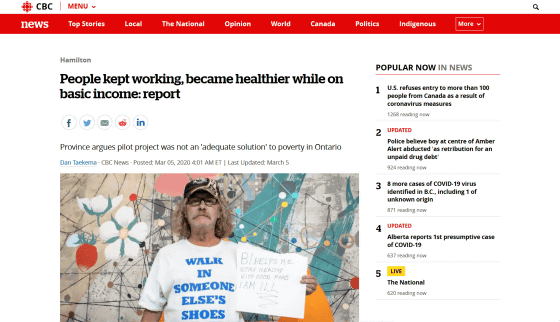Survey results that people do not quit work and improve their health status even with basic income

In
southern-ontarios-basic-income-experience.pdf
(PDF file) https://labourstudies.mcmaster.ca/documents/southern-ontarios-basic-income-experience.pdf
People kept working, became healthier while on basic income: report | CBC News
https://www.cbc.ca/news/canada/hamilton/basic-income-mcmaster-report-1.5485729

The Ontario basic income program was realized by the
The cost of providing basic income is $ 50 million annually (about 3.95 billion yen), the total amount for three years is 150 million Canadian dollars (about 11.85 billion yen), the Conservative Party The administration has determined that it is not worth spending a lot of money. Lisa MacLeod, Minister of Children, Community and Social Services of Ontario from 2018 to 2019, says that basic income does not make people 'contributors to an independent economy' Pointed out.
Todd Smith , Minister of Children, Community and Social Services in Ontario at the time of writing, issued a statement on March 4, 2020 that the state government is considering a program focusing on unemployed . `` A research project that includes only 4,000 people is not the right solution for Ontario, where nearly two million people are in poverty, '' said state government media officer Christine Wood, who described the past basic income program. It was. '

While the state government claims that the basic income program was unsuccessful, a study conducted by
In the Ontario program, low-income people received C $ 16,899 per year for single-person households and C $ 24,000 per year for married households. If the participant earns income from work, 50% of the income is deducted from the basic income, so the annual income of the participant is CAD 34,000 for a single household and CAD 48,000 for a married household If you reach the dollar (about 3.8 million yen), the payment amount will be zero.
Despite 50% of income being deducted from basic income payments, three-quarters of those who worked at the start of the program continued to work after receiving basic income. Also, about half of those who quit their jobs began to go to school to get a better job than before.
`` Many people who choose to continue working have higher hourly wages, better working conditions, and better jobs, '' said Wayne Lewchuk , a professor of economics at McMaster University who surveyed. I was able to do that. ' He says that basic income has helped the poor better contribute to the economy than before.

The research team also conducts face-to-face interviews with 40 Basic Income Program participants. Lewchuk said, 'I was once about to commit suicide. I felt no one cares about me. I didn't know how to live, but with the basic income, I felt like I was a member of society. 'I remember one participant. '
Nearly 80% of survey respondents said they had improved their health while participating in the program, and nearly half reported 'decreased tobacco and alcohol consumption.' With regard to mental health, 83% said that their anxiety and stress had decreased compared to before the basic income was paid, and 81% had regained their self-confidence. Other benefits include improved eating habits, more secure homes, and less frequent hospital visits, with 66% saying family relationships have improved.
'The results of our research show that once people have some degree of stability, their health, mental health and life prospects have improved. I believe that the basic income program ended shortly, which is a tragedy. '

Related Posts:
in Note, Posted by log1h_ik







